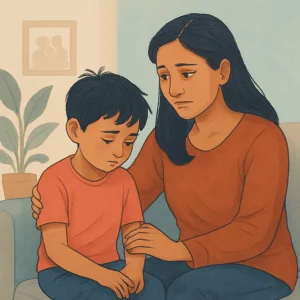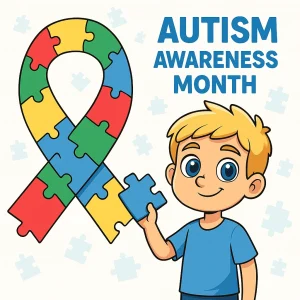The Role of Neurodiversity in Understanding Autism
By Rajini D
Last Updated: April 10, 2025
Welcome to a fresh perspective on understanding the unique ways we think and interact with the world around us, especially when it comes to autism. This concept, known as neurodiversity, celebrates the diverse neurological differences that exist among people. It’s not just a term; it’s a movement towards recognizing and respecting the varied mental landscapes that define each of us uniquely.
Neurodiversity is a powerful lens through which we can better understand autism. Traditionally, autism has been viewed through a medical model, focusing on diagnosis and treatment from a perspective of disorder. However, the neurodiversity framework shifts this view towards one of variation and normalcy, not deficiency. It posits that neurological differences like autism are not errors, but simply variations in the human genome.
Exploring Neurodiversity
Defining Neurodiversity
Neurodiversity, often misunderstood, encapsulates a simple yet profound idea:
- Variability is Normal: Neurodiversity suggests that the differences in our brain functioning are natural variations, not defects.
- Broad Spectrum: It applies to all individuals, recognizing that everyone’s brain operates differently.
- Positive Framework: By viewing mental and neurological differences through this lens, we foster a more inclusive society that values all cognitive styles.
The Neurodiversity Movement
The neurodiversity movement has a rich history that has significantly influenced current perspectives on cognitive diversity:
- Origins: Coined in the late 1990s by Judy Singer, an Australian sociologist who is herself on the autism spectrum.
- Advocacy: It emerged as a challenge to the medical model that labeled neurological differences as disorders needing correction.
- Impact: The movement promotes societal acceptance and support for individuals with neurological differences, advocating for their recognition as a natural part of human diversity.
- Current Practices: It has inspired the adoption of neurodiversity-friendly policies in various sectors, including education and employment.
Know more: History of Autism: Unraveling Autism’s History
Neurodiversity’s Insights into Autism
A New Perspective on Autism
Understanding Autism Spectrum Disorder through the lens of neurodiversity opens up new ways of seeing and supporting autistic individuals:
- Varied Cognitive Styles: Neurodiversity teaches us that autistic traits are not merely deficits to be treated but are part of a broader spectrum of human brain diversity.
- Strengths-Based Approach: This perspective encourages focusing on the strengths and unique abilities of autistic individuals, rather than just their challenges.
- Empowerment and Acceptance: By embracing neurodiversity, society can move towards more inclusive practices that empower autistic individuals, respecting their right to live fulfilling lives on their own terms.
Enhancing Autism Research and Approaches
The influence of neurodiversity on autism research and therapeutic approaches has been transformative:
- Research Paradigm Shift: Neurodiversity has shifted research focus from trying to ‘cure’ autism to understanding how autistic people can best be supported to thrive.
- Innovative Therapies: It has led to the development of therapies that are more respectful of the autistic person’s perspective, promoting self-advocacy and tailored support strategies.
- Policy and Practice: The impact extends beyond individual care to influence policy-making, with educational and workplace accommodations becoming more common.
Stories of Neurodiversity and Autism
Voices from the Neurodiverse Community
Exploring the lives of individuals within the neurodiverse community offers us invaluable insights into both the unique challenges and triumphs associated with autism:
- Diverse Experiences: Every story is a window into how autistic individuals navigate the world, highlighting both the hurdles they face and the extraordinary ways in which they overcome them.
- Success Stories: Many in the neurodiverse community excel in fields ranging from art and science to technology, showcasing their unique skills and perspectives.
- Advocacy and Empowerment: Personal narratives often fuel advocacy efforts, pushing for changes in social perception and policy that support neurodiverse individuals.
How Society Benefits from Neurodiverse Minds
The contributions of neurodiverse individuals extend far beyond personal achievements, enriching society as a whole:
- Innovation and Creativity: Neurodiverse individuals often bring unique problem-solving skills and creativity, driving innovation in various sectors.
- Diversity of Thought: By including neurodiverse perspectives in workplaces, educational institutions, and beyond, we benefit from a broader range of ideas and solutions.
- Cultural Enrichment: Artistic expressions from neurodiverse minds enrich our culture, providing fresh interpretations and insights that might otherwise be overlooked.
Addressing Challenges and Misconceptions
Debunking Myths Around Neurodiversity
Neurodiversity, though increasingly recognized, is often surrounded by myths that can skew our understanding of what it truly means. Here are some common misconceptions and the truths behind them:
- Myth: Neurodiversity is just about autism.
- Reality: While neurodiversity includes autism, it encompasses a broad range of neurological conditions, including ADHD, dyslexia, and more, highlighting the diversity within cognitive processes.
- Myth: Neurodiverse individuals cannot lead successful lives.
- Reality: Many neurodiverse individuals are highly successful in various fields, proving that different neurological configurations can offer unique strengths.
- Myth: Embracing neurodiversity means ignoring the challenges.
- Reality: Acknowledging neurodiversity involves recognizing both the strengths and challenges faced by neurodiverse individuals and ensuring they receive the support they need.
Navigating Social and Professional Barriers
Despite growing awareness, neurodiverse individuals often encounter significant barriers in social and professional environments:
- Workplace Challenges: Many traditional workplaces are not designed to accommodate neurodiverse needs, which can include sensory sensitivities or the need for structured communication. Adapting workplace policies to include flexible work arrangements and sensory-friendly spaces is crucial.
- Social Misunderstandings: Social interactions can be fraught with misunderstandings for neurodiverse individuals, who may communicate or socialize differently. Public awareness campaigns and education can help bridge these gaps.
- Educational Hurdles: Educational systems often lack the resources or understanding needed to support neurodiverse students effectively. Advocating for personalized learning plans and support systems is key to overcoming these hurdles.
Conclusion
Embracing neurodiversity enriches our understanding of autism and highlights the unique strengths of every individual. At Wellness Hub, we champion these diverse minds, providing resources and support that celebrate their potential. We’ve explored the benefits of neurodiversity, heard inspiring stories from the community, and tackled common misconceptions. Still, challenges remain, and your support is crucial. Join us in fostering a more inclusive society where every neurological difference is valued. Discover how you can contribute at Wellness Hub. Together, let’s appreciate and nurture the neurodiverse talents that can inspire and innovate our world.
Frequently Asked Questions:
1 What is neurodiversity and why is it important for understanding autism?
Neurodiversity refers to the different ways the brain can work and interpret information. Recognizing this helps us appreciate and support the unique aspects of autistic individuals.
2. How does the neurodiversity movement benefit autistic children?
The movement promotes acceptance and appreciation of all neurological differences, encouraging supportive environments that enhance learning and development for autistic children.
3. What are some common misconceptions about autism and neurodiversity?
A frequent misconception is that autism needs to be cured; however, the neurodiversity movement sees autism as a variation in functioning, not a defect.
4. How can I support my neurodiverse child’s education and social life?
Seek educational settings that adapt to diverse learning styles and encourage social interaction that respects your child’s unique needs and abilities.
5. What are the advantages of viewing autism through a neurodiversity lens?
This perspective helps us focus on strengths and potential rather than limitations, promoting a positive approach to personal and educational growth.
6. How can workplaces be more inclusive for neurodiverse individuals?
Workplaces can offer flexible work arrangements, create sensory-friendly environments, and provide clear communication that respects neurodiverse employees’ needs.
7. What resources are available at Wellness Hub for parents of neurodiverse children?
Wellness Hub offers a range of resources from educational materials to support groups, all designed to help parents and their neurodiverse children thrive.
8. How can understanding neurodiversity improve relationships with autistic individuals?
By understanding and valuing neurodiverse perspectives, we can build stronger, more empathetic relationships that respect each person’s unique way of experiencing the world.
9. What role do parents play in advocating for neurodiversity?
Parents are crucial in advocating for educational and social adaptations that ensure their children’s needs are met in schools and community settings.
10. How can society change to better accommodate neurodiverse individuals?
Society can promote awareness and education, adjust public policies to support neurodiversity, and encourage inclusivity in all aspects of community life.
About the Author:
Rajini Darugupally
M.Sc., Speech-Language Pathologist (9+ years of experience)
Rajini is a passionate and dedicated Speech-Language Pathologist with over 9+ years of experience, specializing in both developmental speech and language disorders in children and rehabilitation in adults. Driven by a desire to empower each individual to find their voice, Rajini brings a wealth of experience and a warm, genuine approach to therapy. Currently, at Wellness Hub, she thrives in a team environment that values innovation, compassion, and achieving results for their clients.
Book your Free Consultation Today
Parent/Caregiver Info:
Client’s Details:
* Error Message








